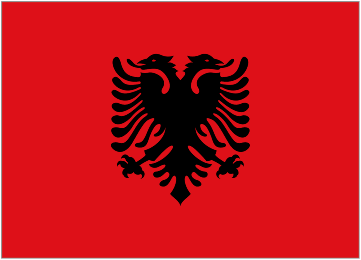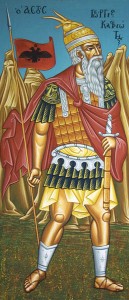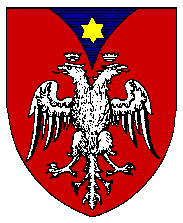November 28

Albania, Albania,
You border on the Adriatic
Your land is mostly mountainous
And your chief export is chrome— Albanian National Anthem
Ok, the above lyrics are not from the Albanian national anthem. They’re from that episode of Cheers where Coach demonstrates how it’s easier to learn factoids when they’re set to music. (Sung to the tune of “When the Saints Go Marching In“.)
Albania is one of the most overlooked countries of Europe, yet one of the most beautiful. And Albanians are fiercely proud of this fact. On no day is Albanian pride more evident than on November 28, Albania’s Flag Day, Independence Day, and just about everything else all wrapped up into one.

Back in 1443 an Albanian by the name of Giorgios Kastrioti, aka Skanderbeg (Lord Skander) was fighting on behalf of the Ottoman Empire against the Hungarians. Years before, the Sultan had usurped the Kastrioti family’s lands. The family had submitted to his rule, converted to Islam, and young Giorgios and his brothers were conscripted. Giorgios was granted the title “Beg”, or Lord. He even became a general in the Ottoman army, winning several battles against the Greeks, the Serbs and the Hungarians.
On November 28, 1443, during a battle against the Hungarians, Skanderbeg and 300 Albanians fighting for the Ottoman Empire suddenly switched sides. Skanderbeg first raised the double-headed eagle banner that is now the flag of Albania.
Skanderbeg soon united the Albanian princes against the Sultan. Through strategy, trickery, wits and will, his greatly outnumbered forces held the Ottoman Empire at bay for over two decades, even after the fall of Constantinople in 1453. The Ottoman army finally subdued Albania in 1479, ten years after Skanderbeg’s death by malaria.

The Ottoman Empire ruled Albania until the early 20th century. In 1908 Albanian fighters sided with the Young Turks, a group fighting to restore constitutional government across the Empire. After the Sultan conceded, the Young Turks loosened restrictions that had banned Albanian language and culture. However, when Albanian nationalism resurfaced, the Young Turk government cracked down harder than before, crushing the Albanian rebellion and enforcing “Ottomanization’.
The tightening of power only inflamed the independence movement. In 1911 Albanian fighters defeated a group of Turkish troops and raised the double-headed eagle flag for the first time since the days of Skanderbeg.
On November 28, 1912, during the height of the First Balkan War, the National Assembly announced that “delegates from all parts of Albania, without distinction of religion, who have today met in the town of Valona, have proclaimed the political independence of Albania…” (Albanian Declaration of Independence)
In 1939 Albania met a new enemy, this time in the West. Italian dictator Mussolini, envious of the ease with which Hitler annexed neighboring countries, tried his own hand as Conqueror. He chose as his victim the mighty kingdom of Albania. King Zog was forced to flee, and Albania experienced 5 years under the Axis. Communist-led nationalist forces liberated the country (Albanians are quick to point out they were liberated not by the USSR but by themselves) on November 29, 1944.
Albania became a communist country, but wasn’t dominated by Moscow. In fact they broke ties with the Soviet Union during the latter’s de-Stalinization. Post-Stalin USSR just wasn’t communist enough for Albania.
On November 28, 1998, Albania voted for a new parliamentary constitution–555 years to the day after Skanderbeg first raised the Albanian flag.
For all these reasons, today, November 28, is Albania’s National Day.
+ + +
In American cinema, Albania enjoys a unique status as the country we’re most likely to scapegoat for arbitrary reasons. In Wag the Dog, Robert Dinero and Dustin Hoffman cook up a fake war against Albania to take the attention off the President’s affair…
“Why Albania?”
“Why not?”
“What have they ever done to us?”
“What have they ever done for us?”
In Tune in Tomorrow, radio serial writer Peter Falk so offends the Albanian-American population with his random Albanian jokes, that he is forced to pick a new arbitrary target: Norwegians.

